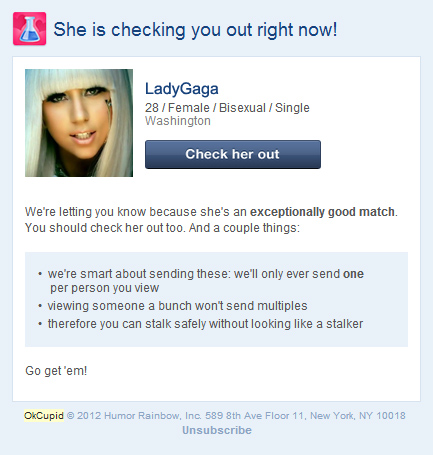Let’s start with a simple question: Would you use Facebook the same way if you knew others were notified when you viewed their page? Certainly, Facebook collect this sort of data on your viewing habits, and the decision not to share information about who has visited you profile is an intentional one. In fact, many sites—perhaps, most notably, dating sites like OkCupid—make the ability to track visitors a central part of their site design. OkCupid regularly sends emails to users when a good match views their profiles. The idea is to turn passive lurking into active interaction. Of course, the purpose of a dating site is to connect strangers.
Lurking, however, has become a definitive part of the Facebook experience. As we now know, most Facebook friends are people we have meet in person. Facebook doesn’t need to break the ice. Yet, users rarely interact with many, if not most, of their Facebook friends. So, why be friends at all? Of course, the answer is that we love to stalk the people in our social networks, especially those weak links on the margins whose live we aren’t keyed into through regular interaction. Today, Facebook stalking plays the same role (albeit more efficiently) that gossip chains played in generations past: It keeps us connected through heavily-mediated and indirect forms of interaction. And, both gossip and Facebook share the unique property of making us more visible to each other.
Gossip invisibly produced visibility by mediating interactions through one or more other people. By getting “the dish” on friends, colleagues, and even rivals, we maintain a sense of closeness and involvement without necessarily intruding or intervening directly in others’ affairs. Gossip is a decentralized form of (mutual) surveillance. This surveillance gives us knowledge about those in our social circles, and it guides our future interactions with those whom we surveil (e.g., it helps us to know when to pursue an opportunity or to offer help). However, this surveillance also guides us as to which topics and situations are to be avoided. That is to say, the invisibility granted by gossip allows us to make us all more visible to each other, but this does not mean we simply know everything about each other; instead, we learn there are many things that we cannot find out about others. We learn what questions cannot be posed—which topics are too embarrassing, too impolite, or too secret to be broached.
Facebook functions similar to gossip in that, through extensive self-documentation, we render ourselves highly visible to one another. Yet, we also leave many clues about what must remain invisible or unknown (Nathan Jurgenson argued this point quiet compellingly in his essay on “Rethinking Privacy & Publicity on Social Media.”) The relationship status field, for example, is often highly contentious. Many people choose to list a close friend or to left it blank in order to avoid drawing light on what might be a sensitive or unstable aspect of their life. When we see a blank or joke relationship status, we immediately recognize that the knowledge revealed in this field only of what is unknown. Such observations produce “a known unknown” (as former Defense Secretary Donald Rumsfeld once said). Thus, the visible self-documentation aspect of Facebook and the invisible lurking aspect work in tandem to reveal both what is known and what is unknown, what is visible and what is visibly invisible. In this sense, it can be argued that privacy and publicity are dialectical in character as opposed to a being opposites on a zero-sum continuum.

Once we recognize the complexity of the relationship between privacy and publicity on social media, we then must ask how user can best adapt to this situation. The question of how in/visibility influences behavior nearly as old as the written word itself. In The Republic, Plato’s character Glaucon, recounts the tale in which Gyges, a shepherd, discovers a ring that makes the wearer invisible. Gyges uses its power to usurp his king’s throne. Glaucon invokes the legend to argue that that morality is a social construct enforced only by fear of reprisal:
man is just, not willingly or because he thinks that justice is any good to him individually, but of necessity, for wherever anyone thinks that he can safely be unjust, there he is unjust… If you could imagine any one obtaining this power of becoming invisible, and never doing any wrong or touching what was another’s, he would be thought by the lookers-on to be a most wretched idiot, although they would praise him to one another’s faces, and keep up appearances with one another from a fear that they too might suffer injustice.
I’m more interested in the sociological implications of Glaucon’s argument than the moral/philosophical ones. Importantly, the legend illustrates the complexity of the relationship between visibility and invisibility. First, there is the fact that Gyges’ invisibility renders others more visible to him. But, Glaucon makes a second, and even more significant, observation about visibility: He notes that what we say to someone’s face—when we are visible to them—is different than what we say behind their back—when we are invisible to them. That is to say, as early as the 4th Century BCE (when The Republic was written), social observers had already recognized that being watched changes our behavior and that different norms exists in circumstances of high visibility and circumstances of low visibility.
The ring of Gyges, however, creates a wrinkle that Glaucon overlooks: If a ring that granted its wearer the power of invisibility truly existed, it would seem to erode any meaningful distinction between speaking to someone’s face or speaking behind their back, because there would always be the potential that the person in question was invisibly lurking on the conversation. We can imagine, for example, that King Gyges’ subjects must have lived in constant fear that even their most private conversations were being overheard, and thus the subjects, presumably, would avoid ever uttering an ill word against the king.
![]()
In many ways, this imaginary situation resembles Michel Foucault’s pantopticon, where prisoners were placed in a circle around a turret with one-way glass, so that they were always visible but never sure if someone was watching. However, the comparison is imperfect. Prisoners in cells never have the luxury of shifting contexts. Gyges and his subjects, on the other hand, would constantly move through an array of different relations between visibility and invisibility. Ironically, Gyges’ subjects were apt to feel less visible in his presence than in his absence. We can envision a dinner scenario, for example, where the subjects might feel free to whisper a few hushed criticisms while Gyges (and, more importantly, his ring) remained visible at the head of the table. If Gyges invisibility heightens his subjects’ sense of visibility, Gyges visibility inversely provides them a greater sense of invisibility.
In the case of Gyges’ ring, visibility does not pertain only to the actors (i.e., the king and his subjects) but also to the technology or infrastructure of visibility. Unlike Foucault’s panopticon, Gyges subjects were able to observe certain instances when surveillance was inactive. The visibility of the invisibility apparatus (i.e., the ring) grants the subjects their own degree of invisibility.
There are two main difference between lurking on social media and the scenario of Gyges and his subjects: 1.) On social media platforms such as Facebook, everyone has the equivalent of an invisibility ring. We no longer have to be concerned with a single lurking king, but with entire “invisible audiences” (see: danah boyd’s piece on networked publics). 2.) Social media networks are asynchronous, meaning that, though others are visible to us, when can’t necessary know what they are doing in real-time—whether they are watching us or whether they are preoccupied with something else.
What makes social media analogous to the ring of Gyges is that, in both cases, those involved have a general understanding of how the technologies of visibility/invisibility operate and shape the dynamics of their situation. Just as the king’s subjects are able to observe the ring and to determine when it is inactive, social media users are able to ascertain what is visible in a specific context and also what can be concealed in that same context. Gyges’ subjects would certainly judge each other based on their ability to conceal their true feelings from the king (and, perhaps, even each other).
Learning “the rules of the game” (a phase lifted from Pierre Bourdieu) allows social media users to be both more visible and more invisible simultaneously. In this context broadcasting that there are things we do not think appropriate to broadcast becomes just as important as what we do broadcast. This observation is highlighted by the fact that many employers are now asking for passwords to log into social media accounts. These employers are likely more interested in ensuring that the applicant is not documenting certain activities (e.g., partying, drug use, criminal activity, etc.) than whatever else the applicant is actually documenting. We find social media user engaged in a range of sophisticated strategies to simultaneously reveal and conceal information (e.g., white-walling [i.e., erasing all messages after they are sent], social steganography [i.e., hiding messages in song lyrics or other codes], the super log-off [i.e., deactivativing an account every time you are done using it], maintaining multiple profiles, tweaking privacy settings, piggy-backing on partner’s/spouse’s accounts to avoid direct use, etc.). We are judged not just on what is revealed but also on what is concealed—not just on what is known but also on “known unknowns.”

Secretiveness and discretion are two sides of the same coin. The former vice demonstrates a lack of awareness as to how to be appropriately visible, while the latter virtue demonstrates an ability to conceal aspects of oneself while embracing visibility. The concept of discretion implies that both visibility and invisibility are desirable—that one does not come at the expense of the other—but that each may be best realized in the context of the other. To be discreet is to be highly visible without ceasing to be invisible; it is also to be visibly invisible. Discretion is a strategy that reflects the complex interaction between visibility and invisibility, publicity and privacy.
Given the complex and interdependent relationship between visibility and invisibility, the ideological divisiveness regarding publicity/privacy or transparency/secrecy may be wrong-headed. When discussing our digitally-mediated environment and how we ought to react to it, we tend to view these categories as being an either/or proposition. The reality is that social media demands that we put greater effort both toward being public and toward being private, being transparent and protecting secrets. We are not best served by being exhibitionists or by being enigmas; instead this new environment calls for discretion.
Interestingly, discretion also require us to modulate our sharing based what we believe others know. Only a fool would act as if others know nothing or know everything. Discretion requires us to make ourselves visible based on what is in/visible about others. Of course, it is easy to know what we can see about others and what they can see about us; the difficult aspect of being discreet is determining the important things others don’t or shouldn’t know about us and the important things that we don’t or shouldn’t know about others, so we can act accordingly. Perhaps it is no small coincidence that the Oracle of Delphi judged Socrates the wisest man in Athens precisely because he was the only one who recognized what was unknown to him.
Social media is not simply a space of widespread surveillance, but, more specifically, a space of ubiquitous lurking, where the capacity to watch without being seen makes us all more watched. However, these circumstances do not simply create a situation where we are all expected to be unconditionally visible; instead, the visibility of the platform and its users actually creates new opportunities for concealment. Discretion—the ability to be both extremely private and extremely public without conflict—is the strategy demand of such an environment. We cannot simple understand social media (or any social phenomenon) from the perspective of what is visible, but we must also consider what is (visibly) invisible.
The ideas emerged in large part through discussion Nathan Jurgenson. See a joint discussion of the complex relationship between visibility and invisibility here.
PJ Rey (@pjrey) is a sociologist at the University of Maryland working to describe how social media and other technology reflect and change our culture and the economy.


Comments 1
Dan — April 5, 2012
A great piece overall. Just one point of fact: there's little evidence that "many employers are asking for passwords for social media." While a disturbing practice, even in isolated cases, the AP story that started the frenzy of concern around this issue only cited one anecdote and even the author of the piece wasn't making a claim that this was a widespread practice.
http://courantblogs.com/investigative-reporting/claim-check-employers-asking-for-facebook-passwords/